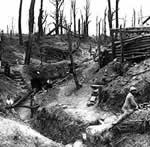Government Announces Scheme to Commemorate WW1
The Government announced this week a new flagship scheme to commemorate the 100th anniversary of World War I and give thousands of schoolchildren the opportunity to visit the Great War battlefields.
Pupils and teachers from every maintained secondary school in England will have the chance to go on a tour of the great battlefields – such as the Somme, Verdun and Fromelles – and take part in remembrance ceremonies on the western front.
World War I study is already compulsory for children aged 11 to 14. This project, part of the Centenary Education Programme, will allow pupils to learn at first hand about the sacrifices made by the troops and the personal stories of those involved in the war effort.
Children who do not visit will also benefit when pupils and teachers who have taken part in the project pass on what they have learnt from their first-hand experience. This could involve establishing commemoration projects, like collecting photographs and uncovering local stories, in their schools and local communities.
Prime Minister David Cameron made the announcement on Thursday, 11 October, as he set out the Government’s plans to mark the centenary of the start of the First World War (WW1) in 2014.
Speaking at the Imperial War Museum, an institution founded in 1917 to record the then still-continuing conflict, Mr Cameron said that he wanted to build a truly national commemoration, worthy of this historic centenary.
Education Secretary Michael Gove said. “The men who gave their lives in the Great War will remain heroes forever. The last British Veteran has now died but their bravery and suffering must never be forgotten.
“This project will ensure that never happens by leaving a lasting legacy of this hugely significant period of our nation’s history and culture. Children will learn, at first hand, about the sacrifices made by individuals and communities to secure our nation and protect our liberty. This tangible experience will reinforce what they have learnt in the classroom.”
Communities Secretary Eric Pickles said, “Wilfred Owen described World War One as the Winter of the world. The sacrifices of our forefathers are our shared heritage and the centenary will be commemorated across the nation and around the globe. We will remember them. It is vital that we help educate the next generation about this important part of our history so that it is never forgotten and I am delighted that my Department is helping this to happen.”
Pat Barker, author of the Regeneration trilogy of novels and a member of the centenary project advisory panel, said, “I have found it an incredibly moving and enlightening experience, especially the monument at Thiepval in Flanders and seeing the names of men who have no graves. I am sure that all children who go on these tours will benefit hugely.
Hew Strachan, Chichele Professor of the History of War at Oxford University, said, “As with the Olympics, so with the centenary of the Great War: the commemoration must bequeath to future generations a legacy that equips them with a deeper understanding of the war, its many meanings and its truly global significance.”
The project will cost £5.3 million, from 2013 to 2019. Half the money is coming from the Department for Education and half from the Department for Communities and Local Government.
A procurement process will be run to decide on a single tour operator before the visits start in spring 2014, running until spring 2019.
As part of the Department for Education’s £15 million investment in cultural education following the Henley Review, we are working with cultural education organisations, including Arts Council England and English Heritage, to develop proposals for schools to mark the commemoration.


